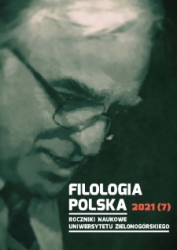Why is “the day of death” better than “the day of birth?” The axiology of Qoheleth in the light of the better-proverbs in Qoh 7:1-4
English
Keywords
Abstract
The article is an exegetic analysis of the passage Qoh 7:1-4 from the Book of Ecclesiastes. The excerpt challenges the absolute statement repeated many times throughout the book about the worthlessness of all things (“vanity of vanities.”) Some values are recognised as “better” than others which may be the evidence of Qoh’s axiology relativity. At first sight, he qualifies the universal lack of values as absolute.. The superiority “good name” over “precious oil” denies the supposed meaninglessness (vanity, ephemerality) of everything. The in-depth analysis of other comparisons present in the passage (“the day of death is better than the day of birth,” “it is better to go to a mourning house than to a wedding house”) shows that a passage which has a pessimistic character due to the elevation of death, may also be interpreted differently. The detailed study of the ancient Hebrew vocabulary in the text also revealed the various levels of the used metaphors.
References
Anderson W.H.U., The Semantic Implications of héḇel and rәCûṯ in the Hebrew Bible and for Qoheleth, „Journal of Northwest Semitic Languages”, vol. 25 (1999).
[Google Scholar]
Barstad H.M., HBL als Bezeichnung der fremden Götter im Alten Testament und der Gott Hubal, „Studia Theologica Lund”, vol. 32 (1978).
[Google Scholar]
Bertram G., Hebräischer und griechischer Qohelet. Ein Beitrag zur Theologie der hellenistischer Bibel, „Zeitschrift für die alttestamentliche Wissenschaft”, vol. 64 (1952).
[Google Scholar]
Bollhagen J., Ecclesiastes, Saint Louis 2011.
[Google Scholar]
Bonora A., Il libro di Qoèlet, [in:] Commenti Spirituali. Antico Testamento, ed. G. Ravasi, Roma 1992.
[Google Scholar]
Di Fonzo L., Eclesiaste, Torino 1967.
[Google Scholar]
Dor-Shav E., Ecclesiastes, Fleeting and Timeless. Part I, „The Jewish Bible Quarterly”, vol. 36 (2008).
[Google Scholar]
Eaton M.A., Suffering and Sin. Ecclesiastes 7:1-8:1, [in:] Reflecting with Solomon. Selected Studies on the Book of Ecclesiastes, ed. R.B. Zuck, Grand Rapids 1994.
[Google Scholar]
Fox M.V., Ecclesiastes. The Traditional Hebrew Text With The New JPS Translation, Philadelphia 2004.
[Google Scholar]
Fredericks D.C., Qoheleth’s Language. Reevaluating its Nature and Date, [in:] Ancient Near Eastern Texts and Studies, vol. 3, Lewiston 1988.
[Google Scholar]
Gordis R., Koheleth. The Man and His World, New York 1951.
[Google Scholar]
Hengel M., Ebrei, Greci e Barbari, Brescia 1981.
[Google Scholar]
Ingram D., Ambiguity in Ecclesiastes, London 2006.
[Google Scholar]
Lauha A., Kohelet, Neukirchen-Vluyn 1978.
[Google Scholar]
Lazaridis N., Wisdom in Loose Form. The Language of Egyptian and Greek Proverbs in Collections of the Hellenistic and Roman Periods, Leiden 2007.
[Google Scholar]
Luther M., Notes on Ecclesiastes, [in:] Luther’s Works, ed. J. Pelikan, vol. 15, Saint Louis 1972.
[Google Scholar]
Miller D.B., Qohelet’s Symbolic Use of héḇel, „Journal of Biblical Literature”, vol. 117 (1998).
[Google Scholar]
Murphy R.E., Ecclesiastes, Dallas 1992.
[Google Scholar]
Ringgren H., Reiterer F.V. and Fabry H.-J., šēm, [in:] Theologisches Wörterbuch zum Alten Testament, ed. G.J. Botterweck, H. Ringgren, H.-J. Fabry, vol. 8, Stuttgart 1995.
[Google Scholar]
Ringgren H., šémen, [in:] Theologisches Wörterbuch zum Alten Testament, ed. G.J. Botterweck, H. Ringgren, H.-J. Fabry, vol. 8, Stuttgart 1995.
[Google Scholar]
Rudman D., The Anatomy of the Wise Man. Wisdom, Sorrow and Joy in the Book of Ecclesiastes, [in:] Qohelet in the Context of Wisdom. Rapports de la 46e session des Journées Bibliques, 30 juillet – 1 août 1997, ed. A. Schoors, Leuven 1998.
[Google Scholar]
Seybold K., héḇel, [in:] Theologisches Wörterbuch zum Alten Testament, ed. G.J. Botterweck, H. Ringgren, H.-J. Fabry, vol. 2, Stuttgart 1977.
[Google Scholar]
Spangenberg I.J.J., Irony in the Book of Qohelet, „Journal for the Study of the Old Testament”, vol. 72 (1996).
[Google Scholar]
Whybray R.N., Ecclesiastes. Based on the Revised Standard Version, Grand Rapids 1989.
[Google Scholar]
Zimmerli W., Zur Struktur der alttestamentlichen Weisheit, „Zeitschrift für die alttestamentliche Wissenschaft”, vol. 51 (1933).
[Google Scholar]
Preview
Downloads
Published
How to Cite
Issue
Section
Categories
Copyright & License

This work is licensed under a Creative Commons Attribution-NonCommercial-NoDerivatives 4.0 International License.
Copyrights (a). In principle, authors who are not employed by the University of Zielona Góra retain the copyright, including publishing rights to the articles, without restrictions.
Copyrights (b). In principle, authors who are employed by the University of Zielona Góra, do not retain the copyright, including publishing rights to the articles. In such cases the copyright holder is the University of Zielona Góra.
Print ISSN
2450-3584-
Abstract631










































